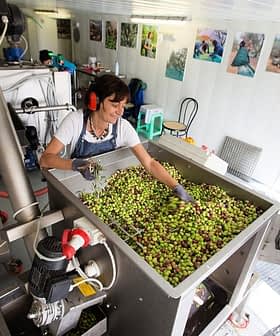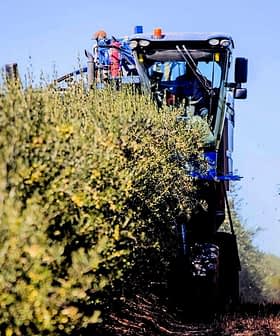The Olio Awards guide published each June by Germany’s top gastronomical magazine, Der Feinschmecker, is one of the industry’s most rigorous reviews. Not only is it highly influential in Germany, it is an important reference in Greece and Italy.
From his native Hamburg, the guide’s founder, Kersten Wetenkamp, shares his reflection on the quality – and lack of it – this year. Read on to find out what he found excellent, disappointing and plain mediocre.
Olive Oil Times: Why do you produce the guide?
Wetenkamp: Freshly cut grass, chives, slicedtomato, basil leaves, green apples, almonds, rosemary leaves and artichoke hearts combined with the flesh of unripe bananas – that’s one way to describe the smell and taste of one of the best Sicilian olive oils produced by Tenuta Orto!
Top olive oils like these offer unforgettable bursts of pleasure for the nose and palate and leave you wanting more. It’s the ninth year that we have produced the guide and it is these moments of happiness that drive us each time to undertake such a huge organizational effort.
How was it prepared?
First, letters were sent to more than 2000 olive oil producers in more than 20 countries. By the February 28 deadline, more than 750 olive oils from 13 countries had been entered. These were submitted to one week of blind taste tests by a 14-member international jury.
Our nine Olio Awards then went to the three top oils in each of the following categories: intensely fruity, medium fruity and light fruity. Der Feinschmecker published the names of these winners and the top 50 oils in a special issue on olive oil in June and we have a searchable list of the top 200 online.
Please tell us about the jury
I was very happy to have what was our most international judging panel so far. For the first time, we had experts not just from northern and southern Italy, Spain and Greece, but also from the U.S. and France.
I am also very pleased that we are maintaining a high standard when it comes to evaluating the oils. In this, I think we are equal to the Marco Oreggia Flos Olei guide and maybe better than most other competitions, from what I’ve been told.
And how were the oils this year?
The rich selection of gourmet olive oils was much cause for celebration, even if the past year had its downfalls. And it was also interesting to see that some biological olive oils are now among the best. It’s a good sign to see the focus on sensory quality and ecological production.
Spain
Spanish producers are so excellent now that no international competition could be without them as they successfully combine the latest technology and a lot of know-how.
This year the Melgarejo family’s Aceites Campoliva, from Andalusia, was the only company worldwide with four oils in our top 200 and three in the top 50. It also had two in our top ten and was the most successful producer overall.
The Melgarejos’ close association with the University of Jaén in research on their Picual variety has paid off handsomely and their Hojiblanca oil is simply fabulous.
As happens every year, producers such as Manuel Montes Marin, Iber, Marques de Griñón and Almazaras de la Subbética were also among the best.
Italy
From 50 best oils worldwide, Italy had 31. There is no changing the dominant role it plays in international competitions.
Cutrera, Terre di Shemir, Mandranova, Giancarlo Giannini, Argei, Librandi, Cetrone, Americo Qutrociocchi, Comincioli and Madoanna delle Vittorie are consistent producers of the best quality, regardless of weather chaos and good or bad harvest conditions.
Sicily’s dominance this year seems to be due to good climatic conditions — especially in the mountain region of Chiaramonte Gulfi north of Ragusa. At that altitude the winter was cold and damp, so the olives ripened perfectly and were able to develop fruit. But I believe the main reason is the high standard of know-how, early harvesting and ensuring that there is less than four hours between harvesting and pressing the olives.
Between Umbria, Tuscany and Lazio in central Italy, a rainy summer and violent storms affected the quantity and quality of the olives. Producers usually accustomed to success, such as the Tuscans Giorgio Franci, Barone Ricasoli, Sonnino and Castello di Ama, did not achieve their usual intensity and abundance of flavors.
France, Portugal, Slovenia and Croatia
I was very glad to see new names with extremely excellent quality in both countries, such as the Monacs in Provence (Nectar de Soleil), and in Portugal, Domaine Salvator, and Victor Guedes. It’s pleasing to see that Portugal seems to have overcome a long dry spell and returned to making excellent olive oil. We also saw a remarkable quality in Slovenia and Croatia.
Greece
The biggest disappointment this year was the absenceof good Greek oil. Unfortunately, there wasn’t a Greek olive oil among our top 50 olive oils. A lot of the Greek oils were simply defective. Among them was Terra Creta, one of our former Olio Award winners.
I think the Greek producers suffered a lot from hot winter weather and maybe too dry a season overall in 2010. When I was in Crete in December it felt like summer, with temperatures of 22 – 25 degrees Celsius (71.6 – 77°F). Producers told us that this leads to higher oil acidity, which is bad for quality, and problems with the olive fly, especially in the lower regions. The olives ripened too early and thus suffered from insect infestation.
“Climate change threatens us,” complained George Dimitriades, head of Biolea estate in west Crete, which produces organic olive oil.
It seemed strange that we received about 50 oils from Greece, which is number three in terms of worldwide production, yet we got 100 oils from France, the fifth-biggest producer! And it was interesting to see that among the best Greek producers were two guys from Germany — Bastian Jordan and Ulrich Meyn from 5Nostimo.
The United States
We had 35 Californian olive oils entered but the overall standard was very mediocre. Perhaps it was due to weather conditions. Only one producer made it into our top 50, Sierra d’Oro, which is a consistently high-quality oil.
Other Disappointments?
Turkey, North Africa, Australia: such a disappointment! Political disaster in Tunisia, Morocco, Syria. Bad quality in Turkey, I don’t know why.
In writing about the Olio Awards recently you called for better quality control in the olive oil industry. What prompted this?
The olive oil market remains in a desperate situation, not only in Germany but also internationally. Inferior quality olive oil continues to be sold – often at bargain-basement prices of less than three euros per half-liter bottle – as “extra virgin.”
And there are no guarantees the origin of the olives. Even if the E.U. regulation requires a clear indication of this, it is often forged to allow discounted prices. After all, olives from Northern Africa and the Middle East are even cheaper than those from Italy and Spain.
Notwithstanding E.U. regulations, the situation remains as dire as it was five years when together with Merum (a wine and olive oil magazine), we published an “olive manifesto” calling for a better method of quality assurance.
If the producer associations from the Mediterranean countries came together to agree on strict quality standards and the enforcement, or at least close monitoring, of oil quality – such as the German winemaking cooperatives did – it would be a dream come true for us at Der Feinschmecker.
Olive Oil Times: Thank you for your time.









